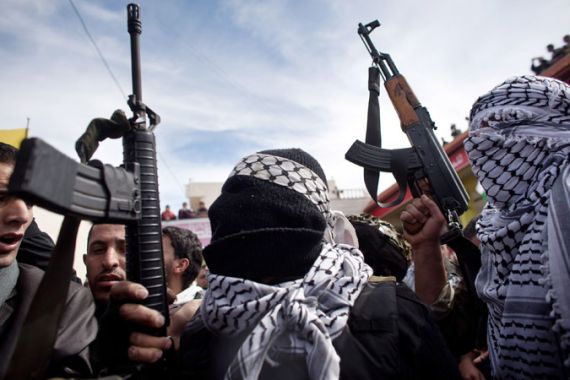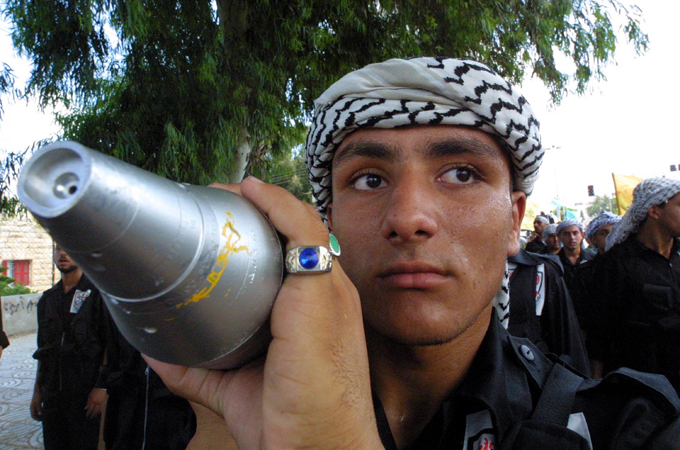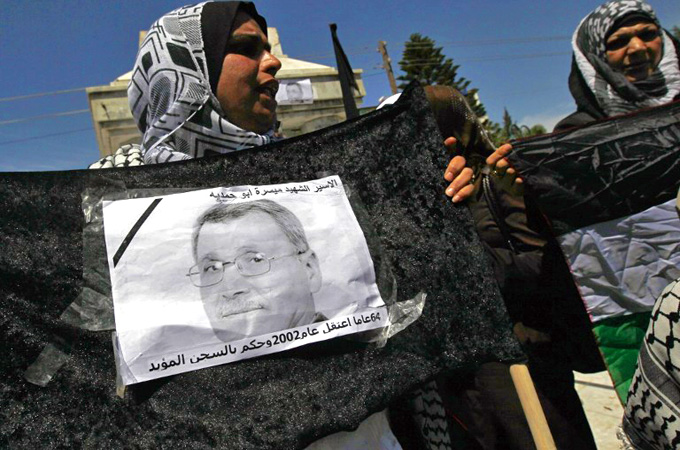Palestinian fighters warn of third intifada
Al-Aqsa Martyrs Brigades commander promotes reconciliation among armed groups, and a response to ‘Israeli crimes’.

Hebron, West Bank – Mourners packed a cemetery on Hebron’s outskirts on a warm spring morning for the funeral of Maysara Abu Hamdiyeh, one the founders of the al-Aqsa Martyrs Brigades that has fought Israel’s occupation of Palestinian lands.
Despite the gates being shut once capacity was reached inside, people continued to climb over the cemetery’s steep walls to see the body carried through the crowd and lowered into the earth.
Abu Hamdiyeh’s life encompassed the major political manifestations of Palestinian nationalism of the 20th century’s latter half: from the General Union of Palestinian Students – the body that facilitated Yasser Arafat’s rise to prominence – to the Fatah party.
Arafat appointed Abu Hamdieh as a general within the Palestinian Authority’s security apparatus, and rumours of his associations with Hamas apparently accounted for President Mahmoud Abbas’s frosty indifference toward his death.
He died in an Israeli prison from cancer in April, and Abu Hamdieh had complained that Israeli authorities never provided him with proper health care.
|
“After the economic problems affecting the PA last year, it was decided we should increase our activities to be ready to make attacks.” – Abu Ubaida, Al-Aqsa Martyrs Brigade |
While regimental PA soldiers stood below, a phalanx of al-Aqsa Martyrs Brigades members bestrode the cemetery’s gates, heads wrapped in the Palestinian keffiyeh and toting automatic rifles and handguns. They followed the burial with a prolonged salvo from their weapons.
Speaking through a megaphone, one of the men told the crowd they were “waiting for a green light” from Abbas to “respond to Israeli crimes”.
“Abu Hamdiyah was one of the founders of the al-Aqsa Martyrs Brigades, helping to set them up in 2000,” Abu Ubaida, one of the leaders of the group, told Al Jazeera, explaining their presence at the funeral.
Al-Aqsa Martyrs Brigades was borne out of the second intifada, as a reaction to the growing popularity of the uncompromising military and political tactics of Islamist groups Hamas and Islamic Jihad, and represented the armed wing of the West Bank’s ruling Fatah party. The US State Department listed the group as a terrorist organisation following its adoption of suicide bombings.
While associated with Fatah, the group claims organisational and military independence, with three autonomous bodies operating in the West Bank’s north, central region and south. A fourth cell operates within the Hamas-ruled Gaza Strip.
Making a comeback
Despite Fatah’s announcement of the al-Aqsa Martyrs Brigades disbandment in January 2008 – following an agreement with Israel to exile the group’s leadership and absorb members into the Palestinian Authority’s security forces – its cadres have been making more frequent public appearances and pronouncements in recent months.
During the early part of this year members of the Israeli security establishment and PA President Mahmoud Abbas expressed fears over a third intifada eventuating. The al-Aqsa Martyrs Brigades would play an important role should open hostilities be resumed between the Palestinian factions and Israel.
Abu Ubaida, the leader of the Brigades’southern command, met Al Jazeera in a village north of Hebron. He explained the group’s re-emergence as a direct consequence of “increased hostility” from Israel in the West Bank, claiming the existence of 450 members.
 |
| An activist from the al-Aqsa Martyrs’ Brigades [Getty Images] |
Along with the use of force, Abu Ubaida deemed such hostility to include Israel’s withholding of the PA’s taxation revenues by Israel following President Abbas’ bid to have Palestinian statehood recognised by the United Nations.
In September 2012, protests broke out across the West Bank against former Prime Minister Salam Fayyad as his government struggled to pay the salaries of civil servants.
“After the economic problems affecting the PA last year, it was decided we should increase our activities to be ready to make attacks,” Abu Ubaida explained.
Third intifada?
Describing the group’s increased activities as precautionary, rather than aggressive, Abu Ubaida said he hoped a third Palestinian intifada would not come to fruition.
“A third intifada will be very harsh, there will be fewer rocks and more weapons,” he warned. “In 1987, it was rocks and burning car tyres. Then the PA came and there were weapons. During the First Intifada I was 18 or 19. I saw kids during the Second Intifada the same age but knowing about weapons and bombs. If there is another one, it will be worse as people have nothing left to lose.”
Abu Ubaida added he did not consider civilians a legitimate target of attacks.
When asked about the Israeli government’s assessment of any threat posed by the al-Aqsa Martyrs Brigades, a spokesman for the Israeli Prime Minister’s Office answered: “We constantly monitor groups that have been involved in terrorism. It would be irresponsible to do otherwise.”
Remaining an avowed Fatah supporter, Abu Ubaida said he believes in establishing a Palestinian state alongside Israel but is critical of Mahmoud Abbas’s performance as president of the PA and chairman of the Palestinian Liberation Organisation.
 |
| A Palestinian woman holds a picture of Abu Hamdiyeh [AFP] |
“Abbas has not done a good job as president,” he said. “Abu Mazen has made a lot of mistakes. He’s tried to create organisations and build a national economy, but we have lost more and more land to settlements and none of the agreements he has signed [with Israel] have been a success. The occupation and Israel cannot be trusted. All agreements have been broken.”
The strategic importance of reconciliation between Palestine’s political factions is not lost on Abu Ubaida, who sees the geographical and political separation of the Hamas-ruled Gaza Strip and Fatah-dominated West Bank as detrimental to the Palestinians’national aspirations.
“Before 2006 there was coordination between all groups. Now that’s gone,” he said. “But look at what happened last November in Gaza when you had members of al-Aqsa Martyrs Brigades working with Hamas during the fighting.”